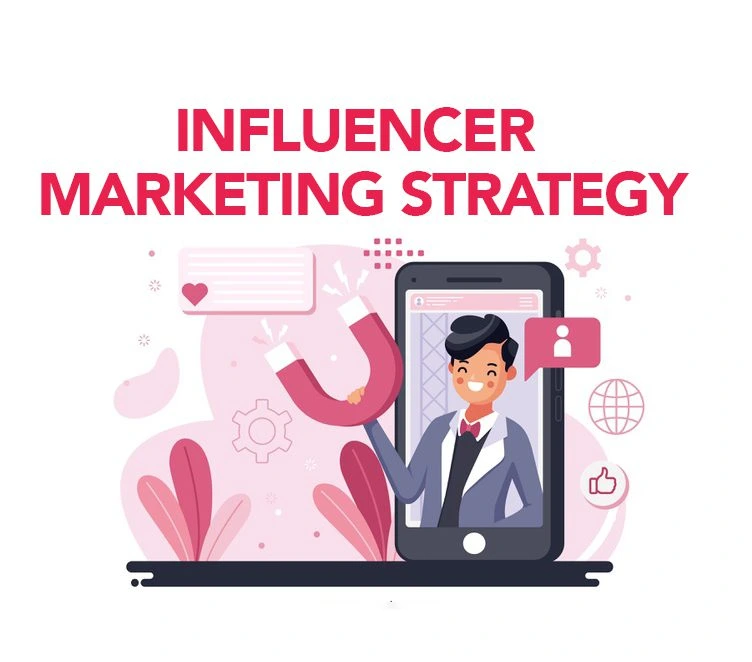
What is Influencer Marketing?
Influencer marketing is a type of marketing strategy that involves collaborating with individuals who have a significant social media following to promote a product or service. These individuals, known as influencers, are typically experts or trusted sources in their respective fields and have established credibility and influence over their audience.
Influencer marketing campaigns can take many forms, such as sponsored posts, product reviews, and giveaways. Brands may compensate influencers for their promotion in various ways, including payment, free products or services, or other incentives.
The goal of influencer marketing is to increase brand awareness, reach a wider audience, and ultimately drive sales. Influencer marketing can be particularly effective in reaching niche audiences and younger demographics who are more likely to trust recommendations from influencers over traditional advertising.
Successful influencer marketing campaigns require a careful selection of influencers who align with the brand’s values and target audience, as well as clear communication and transparency between the brand and influencer.
How To Create An Influencer Marketing Strategy?

Creating an effective influencer marketing strategy requires careful planning and execution. Here are some steps to follow:
1. Define your objectives
Identify your goals for the influencer marketing campaign, such as increasing brand awareness, driving sales, or building brand loyalty.
2. Identify your target audience
Determine the demographics, interests, and behaviors of your target audience to ensure that you select influencers who can effectively reach and engage them.
3. Find the right influencers
Research and identify influencers who align with your brand’s values and target audience. Consider factors such as their social media following, engagement rate, and content quality.
4. Develop a creative concept
Collaborate with the influencer to develop an innovative concept for the campaign that aligns with your brand’s message and resonates with its audience.
5. Establish clear guidelines
Establish guidelines for the influencer’s content, including messaging, tone, and brand mentions. Ensure that the content complies with advertising regulations and is clearly labeled as sponsored content.
6. Track and measure results
Track and measure the results of the campaign to determine its effectiveness and identify areas for improvement. Monitor metrics such as engagement rate, reach, and sales.
7. Build relationships
Nurture relationships with influencers to develop long-term partnerships that can benefit both the influencer and the brand.
Why is influencer marketing effective?

Influencer marketing is becoming an essential component of the marketing plans of many firms. The rise of social media has allowed individuals to build large audiences and establish themselves as authorities in specific niches. These individuals, known as influencers, have the power to influence their followers’ purchasing decisions and can help brands reach their target audience effectively. Influencer marketing works because influencers have built a relationship of trust with their followers.
This trust is built on authenticity, relatability, and the fact that followers feel like they know the influencer personally.
When an influencer promotes a product or service, their followers trust their opinion and are more likely to make a purchase. This is why influencer marketing has become such an effective way for brands to reach their target audience. By partnering with the right influencer, brands can tap into the influencer’s already-established relationship of trust with their followers and promote their products or services in a way that feels authentic and genuine.
Another reason why influencer marketing is effective is that influencers can create engaging and creative content that resonates with their audience. They know their audience best and can create content that speaks directly to them. This can result in higher engagement and brand awareness for the brand, as followers are more likely to share and engage with content that they find interesting and relatable. Influencers are also skilled at creating content that seamlessly integrates a brand’s products or services, making the promotion feel natural and not forced.
Where to find influencers?

There are several ways to find influencers for your influencer marketing campaigns. Here are some common ways to find influencers:
1. Social media platforms
The most obvious place to find influencers is on social media platforms like Instagram, TikTok, YouTube, and Twitter. These platforms have search functions that allow you to search for influencers based on keywords, hashtags, and location. You can also find influencers by browsing popular accounts in your industry and looking at who they follow or who engages with their content.
2. Influencer marketing platforms
Several influencer marketing platforms connect brands with influencers. These platforms have a database of influencers and allow brands to search for influencers based on their niche, audience demographics, engagement rates, and other criteria. AspireIQ and Influencer are two examples of well-known influencer marketing networks. co, and Upfluence.
3. Google search
You can also find influencers by doing a Google search for influencers in your industry or niche. This can lead you to bloggers, YouTubers, and social media influencers who are already creating content around your industry.
4. Referrals
Another way to find influencers is through referrals from your existing network or customers. You can ask your customers or employees if they know any influencers who would fit your brand well. This can be an effective way to find influencers who already have a connection to your brand or industry.
5. Attend events
Attending industry events or conferences can also be a great way to meet influencers in person. You can network with influencers and other professionals in your industry and potentially find influencers who are a good fit for your brand.
Tips for Working with social media influencers

Here are some pointers for collaborating with influencers on social media:
1. Define your goals
Before approaching any influencer, it’s important to define your goals for the campaign. What are you trying to achieve? Is it brand awareness, engagement, or conversions? Knowing your goals will help you choose the right influencer and create a campaign that aligns with your objectives.
2. Choose the right influencer
The success of your campaign depends on the influencer you choose. Look for influencers that share the same values as your company and who are able to connect with their audience on a personal level. Use tools like HypeAuditor, Fohr, or Influencer. co to find influencers who have real engagement and audience demographics that match your target audience.
3. Set clear expectations
It’s critical to establish clear expectations upfront when dealing with influencers. Be clear about what you expect from the campaign, the content format, the timeline, and the compensation. Later misunderstandings will be lessened if this is done.
4. Allow creative freedom
While it’s important to set expectations, you should also allow influencers creative freedom. They know their audience best and what content will resonate with them. Trust their expertise and let them bring their own creative ideas to the table.
5. Establish a good relationship
Building a good relationship with influencers is crucial for a successful campaign. Keep in touch regularly and provide feedback on their work. Showing genuine interest and appreciation for their work will keep them motivated and more likely to work with you again.
6. Measure the results
Finally, it’s important to measure the results of your influencer campaign. Track metrics like engagement, conversions, and ROI to see how the campaign performed. Use these insights to improve future campaigns and optimize your influencer marketing strategy.
Summary
Influencer marketing is a strategy where a brand partners with influencers who have a large and engaged following on social media. Influencers create content that promotes the brand’s products or services, and their followers trust their opinion and are more likely to make a purchase. Brands can find influencers through social media platforms, influencer marketing platforms, Google searches, referrals, and events. In addition, it is worth noting that influencer marketing can provide a number of benefits to brands. For example, it allows them to reach their target audience effectively and promote their products in a way that feels authentic and genuine.
FAQ
Q. What types of influencers are there?
A. There are different types of influencers based on the size of their following and the niche they operate in. Micro-influencers have a smaller following but tend to have higher engagement rates, while macro-influencers have a larger following but lower engagement rates. There are also celebrity influencers who have a massive following and can help brands reach a broader audience.
Q. How do I find influencers for my brand?
A. You can find influencers for your brand through social media platforms, influencer marketing platforms, Google searches, referrals, and events. It’s crucial to pick influencers that share your brand’s values and connect with their audience on a real level.
Q. How can I determine whether my influencer marketing strategy was successful?
A. You can measure the success of your influencer marketing campaign by tracking metrics such as reach, engagement, clicks, and conversions. You may monitor website traffic and conversions using tools like Google Analytics.
Q. How much should I pay influencers?
A. The amount you pay influencers will depend on several factors, including their follower count, engagement rate, niche, and scope of work. Some influencers charge per post, while others charge based on the number of impressions or conversions.


